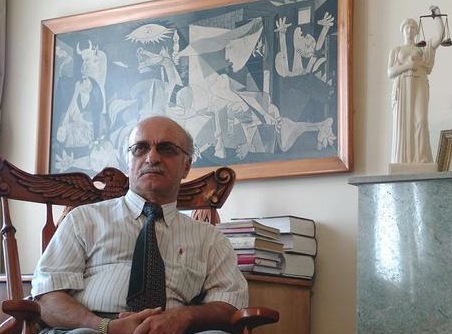Another Human Rights Lawyer Sentenced
Conviction of Khalil Bahramian the Latest in a “Purge” of Human Rights Lawyers
 (6 February 2011) The Iranian Judiciary should immediately halt the ongoing prosecution of prominent human rights lawyers, which appears to be in retaliation for their work defending prisoners of conscience, the International Campaign for Human Rights in Iran said today.
(6 February 2011) The Iranian Judiciary should immediately halt the ongoing prosecution of prominent human rights lawyers, which appears to be in retaliation for their work defending prisoners of conscience, the International Campaign for Human Rights in Iran said today.
The Campaign called for an appeals court to overturn the conviction of Iranian human rights lawyer Khalil Bahramian, 71, who was sentenced by a lower court to 18 months in prison and banned from the practice of law for 10 years.
Branch 28 of Tehran’s Revolutionary Court, presided by Judge Moghisseh, sentenced Bahramian for his defense of political activists on charges of “propaganda against the regime”, and “insulting the head of the judiciary.”.
“Bahramian’s prosecution is part of an ongoing purge of the human rights defense community by the Judiciary, which is effectively criminalizing human rights legal representation,” said Hadi Ghaemi, spokesperson for the Campaign.
“This illegal purge not only leaves the Iranian people without access to legal defense; it is an assault on the universal human right to a legal defense itself and the standards of due process to which Iran is committed under international law,” he added.
Several family members of prisoners of conscience reported to the Campaign that authorities did not let them freely choose their relative’s lawyer, instead telling them which lawyer could or could not take up the case.
Bahramian’s sentence follows those recently imposed on a number of Iranian human rights lawyers and activists, including lawyer Nasrin Sotoudeh (sentenced to 11 years in prison and banned from practicing law for 20 years); Shiva Nazarahari, co-founder of the Committee of Human Rights Reporters and a prominent activist (sentenced to 4 years in prison and 74 lashes); lawyer Mohammad Seifzadeh (sentenced to 9 years in prison and a 10 year ban from practicing law); and E,ad Baghi and Mohammad Oliaefar serving prison sentences.
In an interview with the Campaign, Bahramian said, “I have no fear. I am now waiting to see what the appeals court will say. I have defended political cases for years and during the past 2-3 years, I have concentrated on representing cases in Kurdistan, because I wanted to help create security in Kurdistan.”
Active as a lawyer for 46 years and a member of the International Committee Against Executions, Bahramian has defended political prisoners including Farzad Kamangar and Shirin Alam Holi, who were both unexpectedly executed on 9 May 2010. Regarding Kamangar’s trial, which Bahramian attended, he had earlier said “zero evidence” was presented to convict his client.
Bahramian appealed directly to Iran’s Supreme Leader Ayatollah Khamenei regarding another one of his clients, Zeinab Jalalian, a Kurdish activist now facing execution.
“If the law were respected, I should have been praised for having defended my clients, because during the defense of my clients I expressed many truths,” said Bahramian.
“I am 71 years old and I have been a lawyer for the past 46 years. In the early 1970s, I was pursued by SAVAK [the Intelligence Organization under the Shah] forces. Shortly after the [1979] Revolution, I decided to represent security and political cases, and I think I have represented some 40 cases so far,” he added.
The Campaign called on the Iranian Judiciary to immediately end the prosecution and conviction of human rights lawyers and to respect its international obligations to protect human rights defenders.
“Given the ongoing human rights crisis in Iran, targeting and purging human rights lawyers is certain to further deteriorate an already grave situation,” Ghaemi said.






